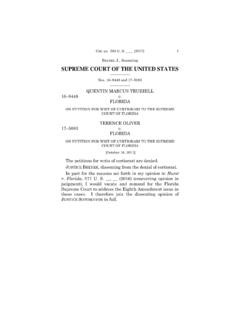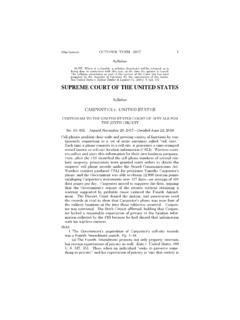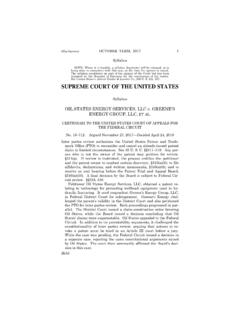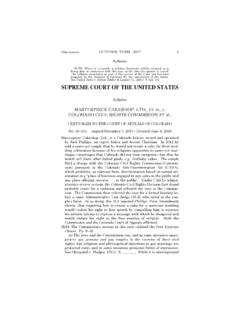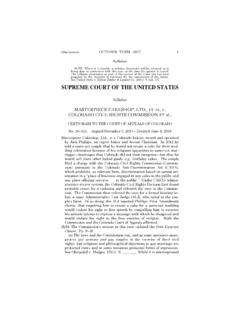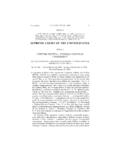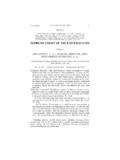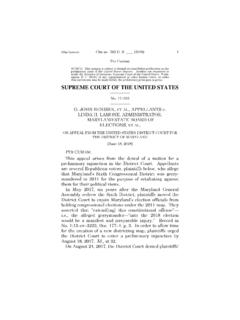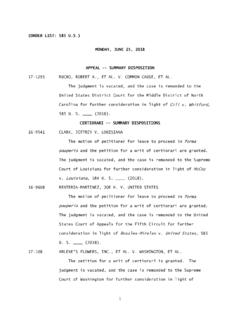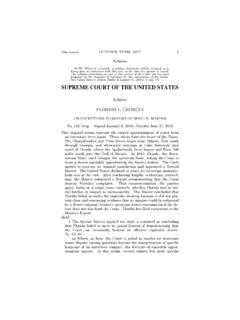Transcription of SUPREME COURT OF THE UNITED STATES
1 (Slip Opinion) OCTOBER TERM, 2014 1. Syllabus NOTE: Where it is feasible, a syllabus (headnote) will be released, as is being done in connection with this case, at the time the opinion is issued. The syllabus constitutes no part of the opinion of the COURT but has been prepared by the Reporter of Decisions for the convenience of the reader. See UNITED STATES v. Detroit Timber & Lumber Co., 200 U. S. 321, 337. SUPREME COURT OF THE UNITED STATES . Syllabus COMPTROLLER OF THE TREASURY OF MARYLAND. v. WYNNE ET UX.
2 CERTIORARI TO THE COURT OF APPEALS OF MARYLAND. No. 13 485. Argued November 12, 2014 Decided May 18, 2015. Maryland's personal income tax on state residents consists of a state . income tax, Md. Tax-Gen. Code Ann. 10 105(a), and a county in- come tax, 10 103, 10 106. Residents who pay income tax to anoth- er jurisdiction for income earned in that other jurisdiction are al- lowed a credit against the state tax but not the county tax. 10 . 703. Nonresidents who earn income from sources within Maryland must pay the state income tax, 10 105(d), 10 210, and nonresi- dents not subject to the county tax must pay a special nonresident tax in lieu of the county tax, 10 Respondents, Maryland residents, earned pass-through income from a Subchapter S corporation that earned income in several STATES .
3 Respondents claimed an income tax credit on their 2006. Maryland income tax return for taxes paid to other STATES . The Mary- land State Comptroller of the Treasury, petitioner here, allowed re- spondents a credit against their state income tax but not against their county income tax and assessed a tax deficiency. That deci- sion was affirmed by the Hearings and Appeals Section of the Comp- troller's Office and by the Maryland Tax COURT , but the Circuit COURT for Howard County reversed on the ground that Maryland's tax sys- tem violated the Commerce Clause of the Federal Constitution.
4 The COURT of Appeals of Maryland affirmed and held that the tax uncon- stitutionally discriminated against interstate commerce. Held: Maryland's personal income tax scheme violates the dormant Commerce Clause. Pp. 4 28. (a) The Commerce Clause, which grants Congress power to regu- late Commerce .. among the several STATES , Art I, 8, cl. 3, also has a further, negative command, known as the dormant Commerce Clause, Oklahoma Tax Comm'n v. Jefferson Lines, Inc., 514 U. S. 2 COMPTROLLER OF TREASURY OF MD. v.
5 WYNNE. Syllabus 175, 179, which precludes STATES from discriminat[ing] between transactions on the basis of some interstate element, Boston Stock Exchange v. State Tax Comm'n, 429 U. S. 318, 332, n. 12. Thus, inter alia, a State may not tax a transaction or incident more heavily when it crosses state lines than when it occurs entirely within the State, Armco Inc. v. Hardesty, 467 U. S. 638, 642, or impose a tax which discriminates against interstate commerce either by providing a direct commercial advantage to local business, or by subjecting in- terstate commerce to the burden of multiple taxation,' Northwestern STATES Portland Cement Co.
6 V. Minnesota, 358 U. S. 450, 458. Pp. 4 . 6. (b) The result in this case is all but dictated by this COURT 's dormant Commerce Clause cases, particularly J. D. Adams Mfg. Co. v. Storen, 304 U. S. 307, 311, Gwin, White & Prince, Inc. v. Henneford, 305 U. S. 434, 439, and Central Greyhound Lines, Inc. v. Mealey, 334 U. S. 653, 662, which all invalidated state tax schemes that might lead to double taxation of out-of-state income and that discriminated in favor of intrastate over interstate economic activity.
7 Pp. 6 7. (c) This conclusion is not affected by the fact that these three cases involved a tax on gross receipts rather than net income, and a tax on corporations rather than individuals. This COURT 's decisions have previously rejected the formal distinction between gross receipts and net income taxes. And there is no reason the dormant Commerce Clause should treat individuals less favorably than corporations; in addition, the taxes invalidated in J. D. Adams and Gwin, White ap- plied to the income of both individuals and corporations.
8 Nor does the right of the individual to vote in political elections justify dispar- ate treatment of corporate and personal income. Thus the COURT has previously entertained and even sustained dormant Commerce Clause challenges by individual residents of the State that imposed the alleged burden on interstate commerce. See Department of Reve- nue of Ky. v. Davis, 553 U. S. 328, 336; Granholm v. Heald, 544 U. S. 460, 469 (2005). Pp. 7 12. (d) Maryland's tax scheme is not immune from dormant Commerce Clause scrutiny simply because Maryland has the jurisdictional pow- er under the Due Process Clause to impose the tax.
9 [W]hile a state may, consistent with the Due Process Clause, have the authority to tax a particular taxpayer, imposition of the tax may nonetheless vio- late the Commerce Clause. Quill Corp. v. North Dakota, 504 U. S. 298, 305. Pp. 12 15. (e) Maryland's income tax scheme discriminates against interstate commerce. The internal consistency test, which helps courts identi- fy tax schemes that discriminate against interstate commerce, as- Cite as: 575 U. S. ____ (2015) 3. Syllabus sumes that every State has the same tax structure.
10 Maryland's in- come tax scheme fails the internal consistency test because if every State adopted Maryland's tax structure, interstate commerce would be taxed at a higher rate than intrastate commerce. Maryland's tax scheme is inherently discriminatory and operates as a tariff, which is fatal because tariffs are [t]he paradigmatic example of a law dis- criminating against interstate commerce. West Lynn Creamery, Inc. v. Healy, 512 U. S. 186, 193. Petitioner emphasizes that by offering residents who earn income in interstate commerce a credit against the state portion of the income tax, Maryland actually receives less tax revenue from residents who earn income from interstate com- merce rather than intrastate commerce, but this argument is a red herring.
